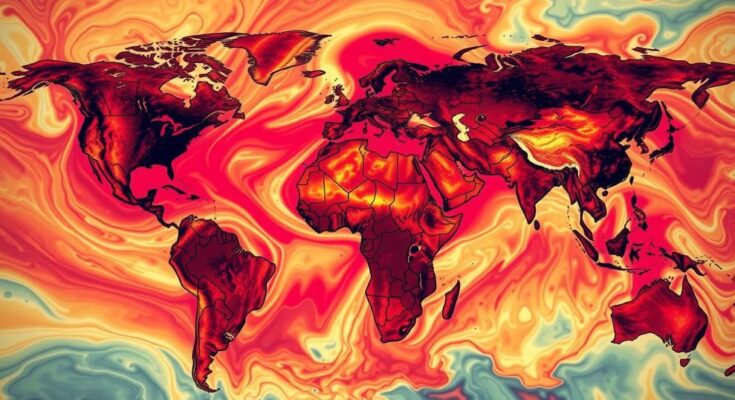The UN has reported a ‘decade of deadly heat’, with 2024 marking the hottest year recorded. The past ten years have seen unprecedented temperatures driven by human activity, resulting in extreme weather events worldwide. Urgent action is needed to reduce emissions and embrace renewable energy to mitigate future climate risks as highlighted by UN Secretary-General António Guterres.
The United Nations has declared the last decade as a period characterized by severe heat, culminating in 2024, the warmest year on record. In his New Year address, UN Secretary-General António Guterres reported that the ten hottest years occurred within the last decade, underscoring a troubling trend driven primarily by human actions. The World Meteorological Organization (WMO) will release official temperature statistics in January, though preliminary assessments indicate 2024’s record-setting temperatures, resulting from rising greenhouse gas emissions that exacerbate extreme weather events and sustain high-temperature trends for future years.
Guterres labeled this phenomenon as ‘climate breakdown, in real time,’ emphasizing the urgency for nations to intervene. He urged immediate action leading into 2025, insisting countries must implement significant emissions cuts and support a transition toward renewable energy sources. Such measures are vital and attainable, he asserted.
Celeste Saulo, Secretary-General of the WMO, echoed similar concerns, stating that every increment of temperature rise introduces additional severe climatic events, with mere temperature readings failing to encapsulate the whole situation. Highlights of the year included unprecedented rainfall and flooding, resulting in tragic losses across numerous nations, while tropical cyclones inflicted significant human and financial devastation, most notably in Mayotte, a French region in the Indian Ocean. Additionally, record temperatures exceeding 50 degrees Celsius ravaged various countries, and wildfires inflicted severe damage.
According to a report from World Weather Attribution (WWA), climate change exacerbated 26 out of 29 studied extreme weather events in 2024, claiming over 3,700 lives and displacing millions. Further, the report indicated that climate change contributed to an additional 41 days of perilous heat during the year. The WMO has stated that as temperatures rise and extreme heat occurrences become more frequent, there is an escalating necessity for global collaboration to mitigate the risks associated with severe heat.
The article discusses the critical influence of climate change exacerbating global temperatures and weather extremes. The past decade has witnessed record-breaking temperatures, driven largely by anthropogenic factors including greenhouse gas emissions. The United Nations and WMO’s reports emphasize the urgent need for countries to curb emissions and transition towards renewable energy to combat ongoing climate impacts. Extreme weather events have led to substantial human and economic tolls worldwide, highlighting the pressing nature of climate action.
In conclusion, the data and statements presented by the United Nations and the World Meteorological Organization reveal a stark reality regarding the state of global temperatures and extreme weather events. Immediate actions are essential to drastically reduce greenhouse gas emissions and transition to sustainable energy solutions. The need for international cooperation to address the escalating risks associated with climate change is underscored, as the impacts of human-induced warming continue to manifest through increased weather extremities and a higher death toll.
Original Source: www.theguardian.com




